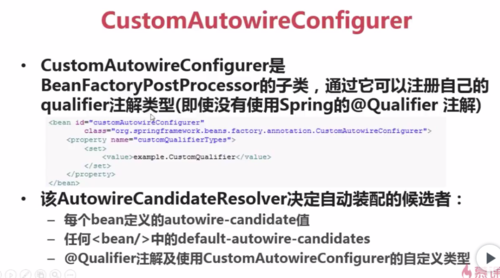-

- 程序员慕虎 2020-09-09
基于泛型的自动装配(Spring4新增的内容,和SPI使用方式相似,只不过Spring提供了更简便的使用方式。API:应用编程接口。SPI:针对服务框架开发或者一些工具的基础使用的特殊类型接口。)
基于依赖对象泛型的自动装配案例
步骤1:
public class IntegerStore {
}
public class StringStore{
@Autowired
private IntegerStore s2;
public void print(){
System.out.println("s2: "+s2);
}
}
步骤2:
@Configuration
public class StoreConfig {
@Bean
public StringStore stringStore(){
return new StringStore();
}
@Bean
public IntegerStore integerStore(){
return new IntegerStore();
}
}
步骤4:测试
@Test
public void testStore(){
ApplicationContext ac=new AnnotationConfigApplicationContext(StoreConfig.class);
StringStore ss=ac.getBean("stringStore",StringStore.class);
ss.print();
}
结果:(如果不加@Autowired注解,s2:为空)
s2: IntegerStore@3323f4c5
基于集合泛型的自动装配(注意:不能使用@Autowired注解,要使用@Resource注解,并且使用@Resource(name="名字1"),去匹配@Bean(name="名字1")。
步骤1:
public class IntegerStore {
}
public class StringStore {
public StringStore() {
System.out.println("无参构造方法执行了");
}
private List<IntegerStore> list;
@Resource(name = "ll")
public void setList(List<IntegerStore> list) {
this.list = list;
}
public void print() {
for (IntegerStore store : list) {
System.out.println(store);
}
}
}
步骤2:
@Configuration
public class StoreConfig {
@Bean(name = "ll")
public List<IntegerStore> ll() {
List<IntegerStore> lis = new ArrayList<IntegerStore>();
lis.add(new IntegerStore());
lis.add(new IntegerStore());
lis.add(new IntegerStore());
return lis;
}
@Bean(name = "stringStore")
public StringStore stringStore() {
return new StringStore();
}
}
测试:
@Test
public void testStore() {
ApplicationContext ac = new AnnotationConfigApplicationContext(StoreConfig.class);
StringStore ss = ac.getBean("stringStore", StringStore.class);
ss.print();
}
}
结果:
无参构造方法执行了
IntegerStore@2b2c8b14
IntegerStore@795ee430
IntegerStore@44d74990
Autowired扩展——自定义qualifier注解(自定义自动化注入配置)

- 0赞 · 0采集
-

- Leyad 2020-06-17

这里最后bean返回Store类型必定是StringStore类型吧?只是在该方法中显示了S1和S2的类名称,而返回的这个实例类id为“stringStoreTest”。这里S1和S2都已经自动装载了,那为什么还要有两个方法提供这两种类型的实体类的获取方法
这里的两个属性上的标注无法执行注入,必须由下方的的bean注解的方法赋值,之所以之前报错,是因为变量stringStore存在两个赋值方法,所以报错。(构造方法是以类型寻找)
- 0赞 · 0采集
-

- 慕莱坞9426565 2020-04-06
CustomAutowireConfigurer
是BeanFactoryPostProcessor的子类,通过它可以注册自己的Qualifier注解类型(即使没有使用Spring的@Qualifier注解)
-
截图0赞 · 0采集
-

- 慕莱坞9426565 2020-04-06
基于泛型的自动装配
-
截图0赞 · 0采集
-

- 慕粉42788080 2020-03-07
自定义自动装配配置类CustomAutowireConfigurer特殊场景可能会需要自己去自定义
-
截图0赞 · 0采集
-

- 慕粉42788080 2020-03-07
基于泛型的自动装配
-
截图0赞 · 0采集
-

- 大鹏111 2019-05-25
基于泛型的自动装配(Spring4新增的内容,和SPI使用方式相似,只不过Spring提供了更简便的使用方式。API:应用编程接口。SPI:针对服务框架开发或者一些工具的基础使用的特殊类型接口。)
基于依赖对象泛型的自动装配案例
步骤1:
public class IntegerStore {
}
public class StringStore{
@Autowired
private IntegerStore s2;
public void print(){
System.out.println("s2: "+s2);
}
}
步骤2:
@Configuration
public class StoreConfig {
@Bean
public StringStore stringStore(){
return new StringStore();
}
@Bean
public IntegerStore integerStore(){
return new IntegerStore();
}
}
步骤4:测试
@Test
public void testStore(){
ApplicationContext ac=new AnnotationConfigApplicationContext(StoreConfig.class);
StringStore ss=ac.getBean("stringStore",StringStore.class);
ss.print();
}
结果:(如果不加@Autowired注解,s2:为空)
s2: IntegerStore@3323f4c5
基于集合泛型的自动装配(注意:不能使用@Autowired注解,要使用@Resource注解,并且使用@Resource(name="名字1"),去匹配@Bean(name="名字1")。
步骤1:
public class IntegerStore {
}
public class StringStore {
public StringStore() {
System.out.println("无参构造方法执行了");
}
private List<IntegerStore> list;
@Resource(name = "ll")
public void setList(List<IntegerStore> list) {
this.list = list;
}
public void print() {
for (IntegerStore store : list) {
System.out.println(store);
}
}
}
步骤2:
@Configuration
public class StoreConfig {
@Bean(name = "ll")
public List<IntegerStore> ll() {
List<IntegerStore> lis = new ArrayList<IntegerStore>();
lis.add(new IntegerStore());
lis.add(new IntegerStore());
lis.add(new IntegerStore());
return lis;
}
@Bean(name = "stringStore")
public StringStore stringStore() {
return new StringStore();
}
}
测试:
@Test
public void testStore() {
ApplicationContext ac = new AnnotationConfigApplicationContext(StoreConfig.class);
StringStore ss = ac.getBean("stringStore", StringStore.class);
ss.print();
}
}
结果:
无参构造方法执行了
IntegerStore@2b2c8b14
IntegerStore@795ee430
IntegerStore@44d74990
Autowired扩展——自定义qualifier注解(自定义自动化注入配置)

- 0赞 · 6采集
-

- 爱吃娃娃菜的阿菜 2019-04-22
CustomAutowireConfigurer
-
截图0赞 · 0采集
-

- 爱吃娃娃菜的阿菜 2019-04-22
基于泛型的自动装配
-
截图0赞 · 0采集
-

- 秋天的落叶1 2019-04-20
@TestJavaBased.java
@RunWith(BlockJUnit4ClassRunner.class)
public class TestJavaBased extends UnitTestBase{
public TestJavaBased(){
super("classpath*:spring-beanannotation.xml");
}
@Test
public void testG(){
StringStore store=super.getBean("stringStoreTest");
}
}
@Store.java
package com.imooc.annotation.javabased;
public interface Store<T> {
}
@StringStore.java
package com.imooc.annotation.javabased;
public class StringStore implements Store<String> {
}
@IntegerStore.java
package com.imooc.annotation.javabased;
public class IntegerStore implements Store<Integer> {
}
@StoreConfig.java
package com.imooc.annotation.javabased;
@Configuration
public class StoreConfig {
@Autowired
private Store<String> s1;
@Autowired
private Store<Integer> s2;
@Bean
public StringStore stringStore(){
return new StringStore();
}
@Bean
public IntegerStore integerStore(){
return new IntegerStore();
}
@Bean(name="stringStoreTest")
public Store stringStoreTest(){//相当于xml:<bean id="stringStoreTest" class="com.imooc.annotation.javabased.Store" ></bean>
syso("s1:"+s1.getClass().getName());
syso("s2:"+s2.getClass().getName());
return new IntegerStore();
}
}
@spring-beanannotation.xml
<context:component-scan base-package="com.imooc.annotation" ></context:component>
CustomAutowireConfigurer(自定义qualifier注解类型,不常用)
(1)CustomAutowireConfigurer是BeanFactoryPostProcessor的子类,通过它可以注册自己的qualifier注解类型(即使没有使用Spring的@Qualifier 注解)
(2)该AutowireCandidateResolver决定自动装配的候选者:
a)每个bean定义autowired-candidate值
b)任何<bean/>中的default-autowire-candidates
c)@Qualifier注解及使用CustomAutowireConfigurer的自定义类型
- 0赞 · 0采集
-

- 小啦同学 2019-04-16
Spring支持基于泛型的自动装配
-
截图0赞 · 0采集
-

- hanhua 2019-02-20
基于泛型的自动装配
-
截图0赞 · 0采集
-

- 韩DD 2019-02-18
CustomAutowireConfigurer 自定义qualifier注解
-
截图0赞 · 0采集
-

- 韩DD 2019-02-18
基于泛型的自动装配
-
截图0赞 · 0采集
-

- ellydebug 2018-11-20
TODO: java SPI的使用,待学习!!
-
截图0赞 · 0采集
-

- scrsh 2018-10-25
CustomAutowireConfigurer
-
截图0赞 · 0采集
-

- scrsh 2018-10-25
基于泛型的自动装配
-
截图0赞 · 1采集
-

- 慕圣6698645 2018-10-04
这节课没全理解
-
截图0赞 · 0采集
-

- IceCoke 2018-09-18
这个例子autowire了两个同样类型的未指定名称,失败了
-
截图0赞 · 0采集
-

- IceCoke 2018-09-18
泛型的装配
-
截图0赞 · 0采集
-

- qq_袮D影孑_03909390 2018-09-15
CustomAutowireConfigurer
-
截图0赞 · 0采集
-

- 慕圣6698645 2018-08-13
CustomAutowireConfigurer
-
截图0赞 · 0采集
-

- 慕无忌6134027 2018-07-25
11111111
-
截图0赞 · 0采集
-

- 猪丶猪侠 2018-06-22
public double number(int a) {
return a;
}
返回值类型指的是public上的double类型,而不是a的类型。
- 0赞 · 0采集
-

- 慕粉7586221 2018-05-23
CustomAutowireConfigurer:
-
截图0赞 · 0采集
-

- 我是猫_夏 2018-04-10
暂时看不懂。。。等待中。。。
- 0赞 · 0采集
-

- 深山老龟 2018-03-31
2
-
截图0赞 · 0采集
-

- 深山老龟 2018-03-31
基于泛型的自动装配
-
截图0赞 · 0采集
-

- Chris_Lee0710 2018-03-17
- 基于泛型的set自定义注解及CustomerAutowireConfigurer(自定义qualifier)
-
截图0赞 · 0采集
-

- kingdompeak 2018-03-08
- 自定义注解的扩展
-
截图0赞 · 0采集




















